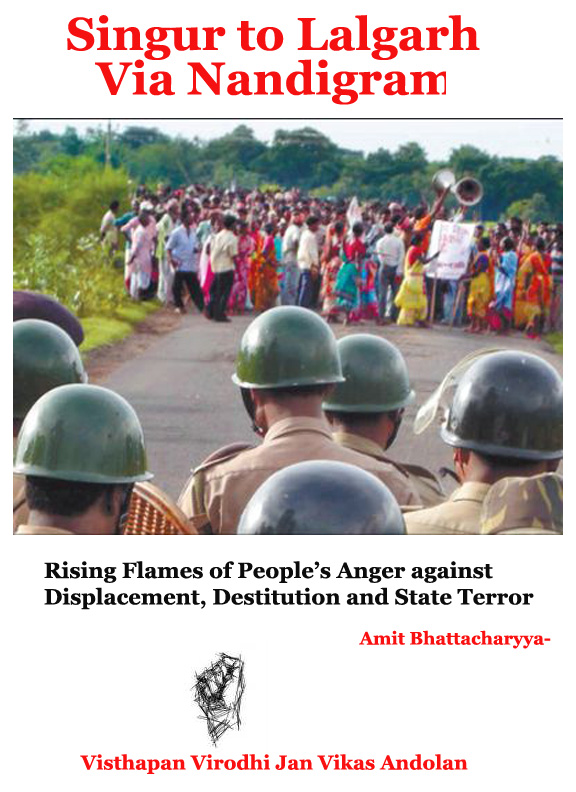YSR search bares ‘peril’ of Maoist combat
Posted by Admin on September 11, 2009
 SANKARSHAN THAKUR
SANKARSHAN THAKUR
Security men in action during the Lalgarh operation
New Delhi, Sept. 10: The desperate effort mounted to trace Y.S.R. Reddy’s chopper in the Nallamala forests last week has had a chilling side effect — the security establishment has realised that for all the high talk on an all-out assault on Naxalites, it is abysmally low on preparedness.
“We commandeer all our resources on land and in the skies and still take more than 24 hours to locate a chief minister’s helicopter whose broad route is known. I think we should not even think about opening a front against Maoist rebels, much less talk about it,” a top police officer, who has been in discussions with the Centre on combating Naxalites, told The Telegraph.
“We can have skirmishes with the Naxalites… but we are in no position to talk about an offensive to the finish, it will be perilous and foolhardy.”
The Centre has been building up to a major confrontation with armed Maoists sometime in early winter. The seven Naxalite-affected states — Chhattisgarh, Orissa, Andhra Pradesh, Maharashtra, Jharkhand, Bihar and Bengal — have been asked to begin the groundwork for what one official called a “comprehensive and full-blown” assault which will most likely include elements of the paramilitary and the armed forces.
According to official estimates, 172 districts which make up as much as 43 per cent of the country’s territory are either affected or controlled by Naxalites, who officially go under the banner of the CPI (Maoist) and espouse armed overthrow of the Indian state.
A June 2009 document of the CPI (Maoist) flags the government’s preparations for an offensive, particularly in the Maad jungles of Bastar, Chhattisgarh, as well as Naxalite resolve to fight it off.
“The scanning of the entire area by satellites is almost on the verge of completion and the satellite images and the concrete topographical map of entire Maad will be ready in another month. Based on this map complete with all hamlets, forest tracks, water points, etc., police and central forces will carry out their operations.
“They are also claiming that preparations are on to check the retreat of Maoist guerrillas into neighbouring areas in Jharkhand and Orissa,” the document says. “We have to once again prepare the people of the area to resist the marauders and mercenaries sent by Sonia-Manmohan-Chidambaram combine to subdue them, destroy their culture, and loot the resources of the region for the benefit of a handful of exploiters. This time the fight will be more long-drawn and more bitter than the one against the British imperialist armies.”
Union home ministry sources say the government’s resolve to “neutralise” the “disruptive dominance” of Maoist cadres over large parts of these states became firmer following the confrontation in Lalgarh. “It became clear from Lalgarh that their strategy is not merely violent takeover of territory but also audacious decimation of the elements of the state by force, that is not something the government can brook.”
But though security experts agree with the need to “outflank and uproot” the Maoists from their expanding bases, along the country’s eastern flank — from Bengal down to Andhra Pradesh through Bihar, Jharkhand and Orissa and Chhattisgarh — they remain deeply sceptical of the offensive in the works.
“It will be nothing less than suicidal to go into an all-out conflict given the state of the capability, capacity and technical and manpower strength of our security forces,” said Ajai Sahni, executive-director of the Institute for Conflict Management, a Delhi-based, counter-terror think tank headed by K.P.S. Gill.
Sahni would not even take credible cognizance of the government’s planned offensive against Naxals. “We are so thoroughly unprepared, I do not even believe we are preparing for a military operation, it could be just a rumour floated on the basis of some exercises being carried out. But if this does happen, it will only lead to a whole series of adverse implications, the biggest of which will be large-scale security the civilian fatalities. Where are you going to go in, who are you going to fight, do we even have an idea?”
Sahni’s boss, K.P.S. Gill, who was for a short period adviser to the Chhattisgarh government on anti-Naxal operations, concurred that the lessons from the search of YSR’s chopper were grim.
“It proved to us how primitive we are even with supersonic aircraft which can do thermal imaging. If we cannot locate a chopper, which isn’t really a small object, for more than a day after we have pressed all are resources into action, it tells us a sad story. We are terribly ill-equipped and, more than that, we remain terribly backward in integrating our security systems. For a start, we have no ability yet to receive, interpret and synchronise data or information real time. We are nowhere in an offensive with Naxals if we cannot do that, even if we have correct information, it has turned stale by the time it gets to the man on the ground, he is either dead or doing nothing to his adversary,” Sahni argued,
“We are poorly equipped, badly trained and grossly undermanned, and those are things the government will have to take into account before it decides to move in.” TT

























Leave a comment